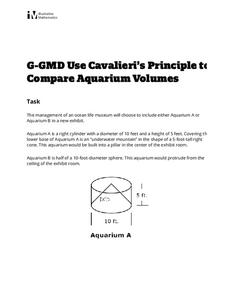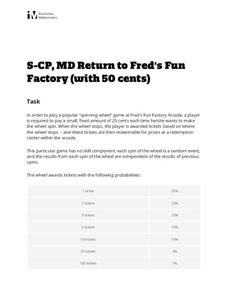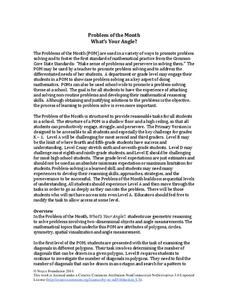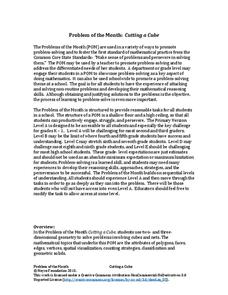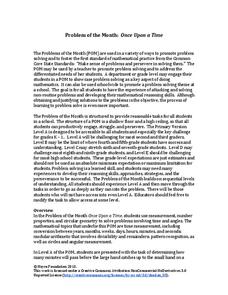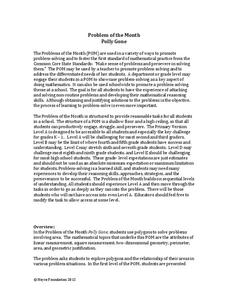Illustrative Mathematics
Right Triangles Inscribed in Circles I
One of the basic properties of inscribed angles gets a triangle proof treatment in a short but detailed exercise. Leading directions take the learner through identifying characteristics of a circle and how they relate to angles and...
Odyssey of the Mind
Odyssey of the Mind Curriculum Activity: Made Up Math
Is there a way to connect creative thinking, logical reasoning, mathematical understanding, and humor? You bet there is! Kids begin by creating creative math quizzes, which require creative thinking to solve. For example, 1+1=24, one...
Noyce Foundation
Surrounded and Covered
What effect does changing the perimeter have on the area of a figure? The five problems in the resource explore this question at various grade levels. Elementary problems focus on the perimeter of rectangles and irregular figures with...
KenKen Puzzle
KenKen® Puzzle
Think inside the box with KenKen® puzzles to provide some problem solving practice. These puzzles are similar to Sudoku, but require computation inside designated boxes. There are multiple puzzles with a range of difficulties to...
Noyce Foundation
The Wheel Shop
Teach solving for unknowns through a problem-solving approach. The grouping of five lessons progresses from finding an unknown through simple reasoning to solving simultaneous equations involving three and four variables. Each lesson...
Noyce Foundation
Movin 'n Groovin
Examine the consequences of varying speed. An engaging set of five problem sets challenges young mathematicians by targeting a different grade level from K-12. In the initial lesson, scholars make conclusions about the time it...
Noyce Foundation
On Balance
Investigate the world of unknown quantities with a creative set of five lessons that provides problem situations for varying grade levels. Each problem presents a scenario of fruit with different weights and a balance scale. Using the...
Noyce Foundation
Digging Dinosaurs
Build a function to solve problems rooted in archeology. A comprehensive set of five lessons presents problems requiring individuals to use functions. The initial lesson asks learners to find the possible number of dinosaurs from a...
Noyce Foundation
The Shape of Things
Investigate the attributes of polygons. A thorough set of lessons presents problem scenarios for elementary through high school classes. The first lessons focus on basic characteristics of polygons, including the line of symmetry. As the...
Noyce Foundation
First Rate
Explore distance and time factors to build an understanding of rates. A comprehensive set of problems target learners of all grade levels. The initial problem provides distance and time values and asks for the winner of a race. Another...
Noyce Foundation
Tri-Triangles
Develop an understanding of algebraic sequences through an exploration of patterns. Five leveled problems target grade levels from elementary through high school. Each problem asks young mathematicians to recognize a geometric pattern....
Noyce Foundation
Diminishing Return
Challenge individuals to compete as many tasks as possible. Lower-level tasks have pupils apply costs and rates to solve problems. Upper-level tasks add algebraic reasoning and conditional probability to the tasks.
Illustrative Mathematics
Sum of Angles in a Polygon
How can learners use algebra to solve a geometry problem? Help learners create an equation that shows the relationship between the number of sides of a polygon and the sum of the interior angles. Young scholars are asked to divide the...
Teach Engineering
Solving Energy Problems
Here's your chance to save the world. The eighth lesson in a 25-part Energy Systems and Solutions unit has young scientists come up with ideas for individual or group projects. They identify ways to solve the energy crisis. Hope they...
Illustrative Mathematics
Use Cavalieri’s Principle to Compare Aquarium Volumes
Learners are designing a stunning new water feature for an aquarium, but they soon discover that more than just a pretty home for their fishy friends is required. From calculating the volume of a composite shape through the...
Illustrative Mathematics
Shortest Line Segment from a Point P to a Line L
One of the hardest skills for many young geometers to grasp is to move beyond just declaring obvious things true, and really returning to fundamental principles for proof. This brief exercise stretches those proving muscles as the...
Illustrative Mathematics
Return to Fred's Fun Factory (with 50 Cents)
The penny arcade gets the statistics treatment in this fun probability investigation. A non-standard game of chance is described and then the class is set loose to find missing probabilities, determine common outcomes, and evaluate...
Florida Center for Instructional Technology
A Human Number Line: Teacher Notes
Twenty-one pieces of tagboard can lead your class to a greater understanding of integers when you use them to form a human number line. After creating this math tool, two strategies for adding and subtracting will have your...
Noyce Foundation
What's Your Angle?
Math can be a work of art! Reach your artistic pupils as they explore angle measures. A creative set of five problems of varying levels has young learners study interior and exterior angle measures of polygons. The introductory levels...
Noyce Foundation
Double Down
Double the dog ears, double the fun. Five problems provide increasing challenges with non-linear growth. Topics include dog ears, family trees and population data, and geometric patterns.
Noyce Foundation
Cutting a Cube
Teach the ins and outs of the cube! A series of five K–12 level activities explore the make-up of the cube. The beginning lessons focus on the vocabulary related to the cube. Later lessons explore the possible nets that describe a cube....
Noyce Foundation
Cut It Out
Explore the mathematics of the paper snowflake! During the five lessons progressing in complexity from K through 12, pupils use spatial geometry to make predictions. Scholars consider a folded piece of paper with shapes cut out....
Noyce Foundation
Once Upon a Time
Examine the relationship between time and geometry. A series of five lessons provides a grade-appropriate problem from elementary through high school. Each problem asks learners to compare the movement of the hands on a clock to an angle...
Noyce Foundation
Poly-Gone
Investigate polygons from rectangles to triangles to octagons. Each level of the five-problem series targets a different grade level. Beginning with the level A problem, learners examine the relationship between area and perimeter by...














